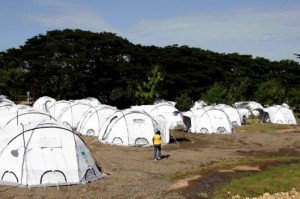Flood survivors in Mindanao rebuild in danger zones

A woman walks past tents at a temporary relocation site for residents affected by the devastating flash flood at Tambo village in Iligan City in this December 29 file photo. AFP
ILIGAN — Less than six weeks after killer floods swept away their slum homes along a Philippine river, Lydia Abulanda and her neighbours are rebuilding despite warnings disaster could strike again.
In a poverty-driven tale repeated with depressing frequency across the storm-plagued Southeast Asian nation, Abulanda said they had no other option but to take their chances again in the danger zone.
“We have nowhere else to go,” the 41-year-old housewife said as she stood amid the shantytown ruins of Ilagan city, where tropical storm Washi swept away entire communities in mid-December.
The government said at least 1,268 people were killed in the storm, but the total number of fatalities may never be known as entire families were washed away, leaving no survivors in unofficial slum areas to report the deaths.
Government officials said many of the victims were slum dwellers who had flocked to dangerous riverbanks because they could not afford to buy land or build homes in safer areas.
Article continues after this advertisementSlums hugging riverbanks, exposed coasts and other areas vulnerable to extreme weather are seen across the Philippines, where roughly a quarter of the country’s 100 million people live on a dollar a day or less.
Article continues after this advertisementAn average of 20 tropical storms or typhoons hit the Philippines each year, many of them deadly, and the floods and winds typically punish the poorest members of society the most.
In Ilagan and other parts of the southern Philippines hit by Washi, the government and aid groups are trying to find safe new homes for thousands of survivors, but many will inevitably end up living back in dangerous areas.
As she visited the flood-hit city last week, the United Nations’ top disaster official said she was troubled by the way people seemingly refused to learn from the disaster.
“Yes, it bothers me that people forget so quickly,” Margareta Wahlstrom, the UN special representative for disaster risk reduction, told Agence France-Presse as she inspected the affected areas.
On both sides of a shattered bridge near Iligan, Wahlstrom saw residents using plywood and tarpaulin to erect shanties on the riverbank where homes had been swept to sea 40 days earlier.
The mayor of Iligan, Lawrence Cruz, told Wahlstrom in a meeting witnessed by AFP that the city government did not have the P300 million ($7 million) needed to buy land for the relocation of survivors.
The government initially sheltered thousands of displaced people in schools and gymnasiums but, with classes resuming in the new year, has been trying to move them out to temporary shelters.
Mother of three Maria Teresa Tampang, 37, said conditions were hard in the makeshift centre where she and about 180 families were living in tents donated by a South Korean aid organization.
“It is really hard in this evacuation area. There are a lot of people getting sick, with recurring coughs,” Tampang said, holding her baby in her arms.
“The tents are hot, even at night. But our bed is the hard ground and that is cold.”
Wahlstrom said she noted overcrowding at evacuation centres and said there was a need to lift spirits.
“It’s critical that people [in the shelters] stop being unhappy,” she said.